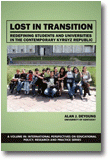
Lost in Transition
Redefining Students and Universities in the Contemporary Kyrgyz Republic
By:
Alan J. DeYoung, University of Kentucky
A volume in the series: International Perspectives on Educational Policy, Research and Practice. Editor(s): Peter Moyi, University of South Carolina. Supriya Baily, George Mason University. Ayesha Khurshid, Florida State University.
Published 2011
Being a “student” has been and remains a highly desirable status for young people and their families in Kyrgyzstan. “Giving their children education” (dat detyam obrazovaniye) – meaning “higher education” - has become an imperative for many parents, even in a time of serious economic and social decline. The numbers of universities and university enrollments have increased dramatically – in fact quadrupled – since Kyrgyz independence from the former USSR in 1991. All this is happening just as the overall system of secondary education has basically collapsed. School quality and outcomes of learning for most Kyrgyz youth have become increasingly marginal – even as those who run universities widely proclaim quality improvements and desires/intentions to join international higher education space. The book thus seeks to explain the manifest versus the latent functions of higher education in Kyrgyzstan. Relying on explanations of lived experience, the research attempts to explain how the seeming contradiction of a declining resource and intellectual base of universities yet appeals to parents and students as the system continues to expand with easily compromised accountability measures. The study approaches these topics by seeking to define what it now means to be a university student in Kyrgyzstan, as well as what many state universities have turned into" in contrast in contrast to how they were remembered by those who attended and taught within them two decades ago. The work also considers a number of private and inter-governmental universities which are allowed to operate in Kyrgyzstan and award both state and international diplomas. I portray the different organizational and ideological pursuits of these universities as they contrast with those of the state universities.
Lost in Transition is an empirical look at higher education reform in Kyrgyzstan, employing several methodological strategies. These include a student survey given to over 200 students at five different universities; surveys and interviews with senior instructors and administrators at these same institutions; and a two-year case study of a student and faculty cultures and subcultures at one particular national university particular university faculty in one of the larger state universities. The case study utilized participant observation, ethnographic interviews, document analysis, and social media.
CONTENTS
Introduction. 1. Education and Socialization: Deconstructing the Soviet Imperative. 2. Students Making Decisions about the University. 3. On Being a Student at Bishkek New University: Social Scenes and Situations. 4. On Being a Student at Bishkek New University: Students, Student Groups, and Classes. 5. University Use and University Quality: Then and Now. 6. Faculty of Foreign Languages: Academic Culture Compromised. 7. Concluding Remarks and International Perspectives on the Kyrgyz Higher Education Scene. 8. Appendix. References.
-
Paperback978-1-61735-230-0
Web price: $45.04 (Reg. 52.99)
-
Hardcover978-1-61735-231-7
Web price: $80.74 (Reg. 94.99)
- eBook9781617352324

- EDU015000 - EDUCATION: Higher
- EDU037000 - EDUCATION: Research
- EDU038000 - EDUCATION: Student Life & Student Affairs
-
 Educational Restructuring
International Perspectives on Traveling Policies
Educational Restructuring
International Perspectives on Traveling Policies
-
 Emerging International Issues in Student Affairs Research and Practice
Emerging International Issues in Student Affairs Research and Practice
-
 Handbook on Comparative and International Studies in Education
Handbook on Comparative and International Studies in Education
-
 Immigrant Youth Who Excel
Globalization's Uncelebrated Heroes
Immigrant Youth Who Excel
Globalization's Uncelebrated Heroes
-
 International Perspectives on Bilingual Education
Policy, Practice, and Controversy
International Perspectives on Bilingual Education
Policy, Practice, and Controversy
-
 Keep Calm, Teach On
Education Responding to a Pandemic
Keep Calm, Teach On
Education Responding to a Pandemic
-
 Surviving the Transition? Case Studies of Schools and Schooling in the Kyrgyz Re
Surviving the Transition? Case Studies of Schools and Schooling in the Kyrgyz Re

